Published Feb 9, 2022
Deep Space Nine’s Aromantic Love Story
How Star Trek made space for a queer woman like me.
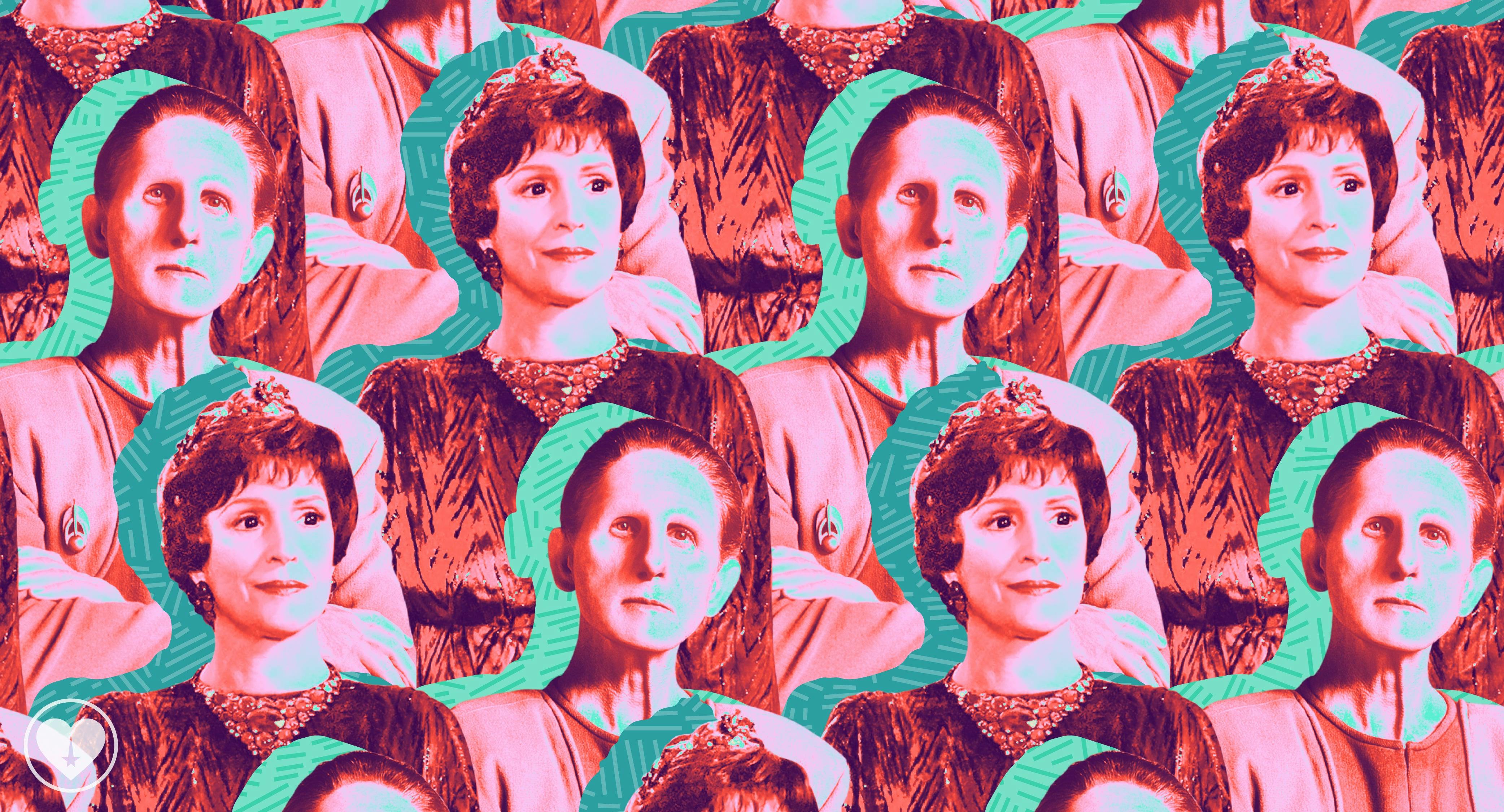
StarTrek.com
Lwaxana Troi has a very specific appeal to me. For someone who grew up on Jane Austen adaptations, Lwaxana is the perfect manifestation of a traditionally ridiculous Austen character — equal parts Mrs. Bates and Lady Catherine de Bourgh. By exaggerating the concepts of romantic and sexual attraction to the extreme, she ends up painting a fairly accurate picture of how it feels for me to navigate reality. As an aromantic and asexual woman, I am Deep Space Nine’s Constable Odo, and the entire world is Lwaxana Troi.
The pervasive assumption that romantic and sexual desires are experienced by everyone is frustrating to navigate. It takes my decisions, my beliefs, and my emotions, and tries to force them to fit a narrow mold of expectations. As an aromantic woman, I do not feel romantic attraction to anyone, regardless of gender. This doesn’t stop people from assuming that a friendship with a boy my age is about to blossom into that treasured first love of high school. As an asexual woman, I do not feel sexual attraction to anyone, regardless of gender. This doesn’t stop college dorm mates from collectively insisting I went to see that one action movie for its shirtless scene.
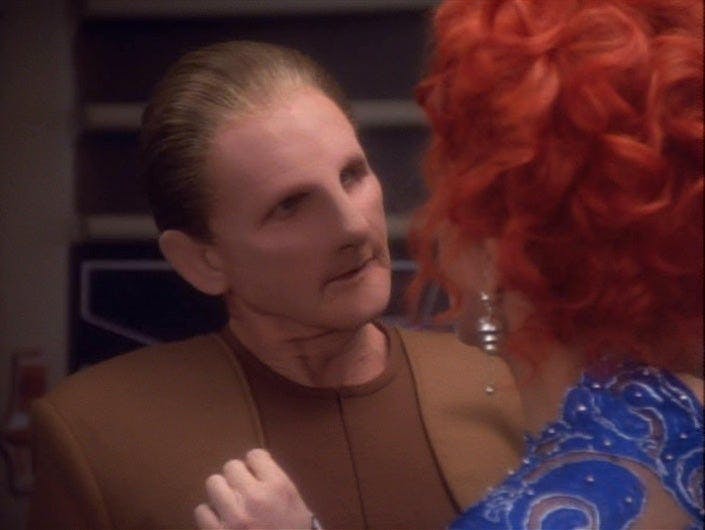
StarTrek.com
Of course, Lwaxana isn’t the only one asking Odo to conform to societal standards that are falsely deemed universal. We first hear about Odo’s opinion of romance in the first season of Deep Space Nine, “The Forsaken.” In this episode, Lwaxana Troi has paid the station a visit and becomes smitten with the shapeshifting Constable Odo. Perturbed, Odo asks Commander Benjamin Sisko to be a barrier between himself and Lwaxana’s affections.
Sisko’s response is to give a playful grin and ask Odo what could possibly be wrong with a little romance? In frustration, Odo rants about how humanoid mating rituals are absurd and make no sense to him. There’s no emotional landing point in Odo for these dead flowers and bad poetry, a sensation very familiar to me.
Because aromanticism and asexuality are not nearly as well-known as other orientations, I spent a significant portion of my life just assuming I was straight, because I didn’t know there were terms to define me. As a result, I ended up in two relationships in college. On an intellectual level, I knew about the flowers and the handholding and the sitting-with-his-arm-over-your-shoulders. But when these things happened, they were just things that happened.
I knew that there was a response I was supposed to have to these things, and so I conformed. I projected emotions that I did not feel in order to satisfy the societal expectations around me, in order to let my friends giggle at the display.
When Odo and Lwaxana find themselves trapped in an elevator together, Odo begins to open up about himself. He discusses how he performed for the scientists who raised him in order to be accepted. He had to shape and mold himself not just into entertaining delights but into a consistent, humanoid shape that becomes too painful to bear every sixteen hours. For the sake of acceptance into the only society he had ever known, Odo did harm to himself daily.
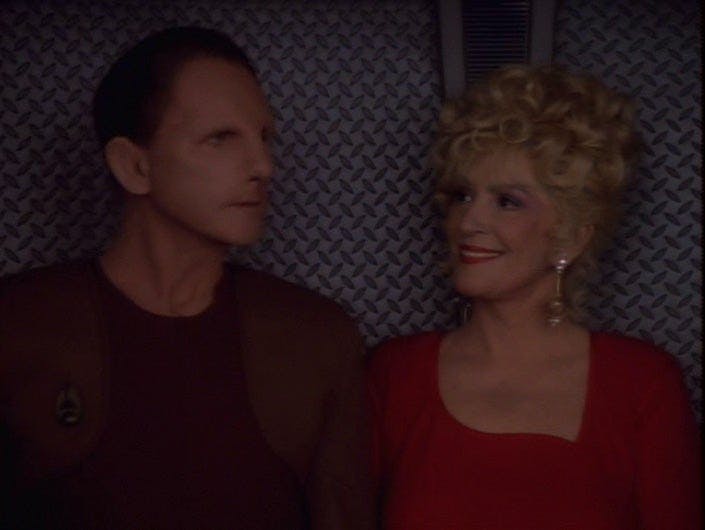
StarTrek.com
“Odo, be a chair!” I’m a chair. “Odo, be a razorcat!” I’m a razorcat. Life of the party.
– Odo, “The Forsaken.”
Like Odo trying to hold his shape as the sixteenth hour closes in, it was painful to keep up this front of emotions that I was supposed to have but didn’t. The men I dated were good and kind and I had nothing to reproach them with, but I had to keep forcing reactions that weren’t natural to me, because I didn’t know what my natural shape of affections was. You cannot express what you don’t know, and only expressing yourself as what you are not leaves you with very little.
Since no one was exactly sure what I was, Mora labeled me “Unknown Sample,” which the overseer translated into Cardassian as “Odo'ital” …[which] literally means the word “nothing.”
- Odo, “Heart of Stone”
Discovering the terms “aromantic” and “asexual” was much like Odo discovering the Dominion (without the galactic imperialism). Learning what you are contains a freedom to express it. Odo learned to enjoy and relish his shapeshifting capabilities. I learned what types of relationships fulfill and nourish me.
And yet, no matter how joyful this freedom is, it doesn’t eliminate emotional needs. Stereotypes about aromantic and asexual people frequently involve assumptions of coldness, of the inability to love or receive love at all. In Deep Space Nine, Odo starts out embodying this stereotype. He proudly states his self-sufficient nature as a rebuttal to Sisko’s encouragement to play along with Lwaxana’s affections. It’s not just romance that Odo rejects, it’s all interpersonal intimacy.
This is why it’s significant that, as Lwaxana hears about how Odo was raised by scientists, her tone changes. Compliments about his attractiveness and boasts about her various conquests vanish, and instead she simply says that his life “sounds very lonely.” When she says he ought to attend one of her parties, it’s not to flirt, but to rebuff the idea that he can only be accepted as a party trick.Lwaxana’s compassion culminates as Odo approaches the sixteenth hour and can no longer hold the shape he uses to be accepted by society. Her earlier crass comment about his liquid form – “I can swim.” – is forgotten as she meets his vulnerability with her own. Her removal of her wig is more than just allowing Odo to see a side of her she shows to no one else. It’s also a means to distance herself from the highly romantic character that she met him as. Lwaxana puts her romantic and sexual attraction aside in order to meet Odo’s emotional needs in an intimate way.
This is something we don’t get to see often in fiction. It’s frequently the character coded as aromantic or asexual that has to yield. In order to be free of their stifled existence, this character must fall into romantic love or get laid, and voilà, their emotional needs are magically met. Or perhaps it’s not that the character has to be free, but rather that they are selfish for not wanting to take the step into a romantic relationship.
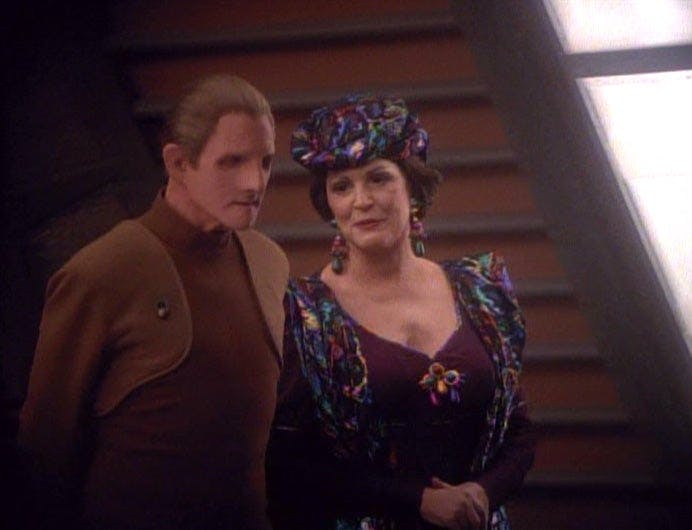
StarTrek.com
Both of these interpretations – the stifled and the selfish – have charted the course for many conversations and relationships in my life. Even replying to a question about my love life with “happily single,” is enough to prompt lengthy assurances that I will find someone someday. Worse were the friends who distanced themselves from me once they realized I was not a dating option, as if the only value I had to offer was romance.
So, there is this great validation in seeing Lwaxana Troi, this highly romantic Jane Austen caricature of a woman, be the one to yield. In rewatching her three Deep Space Nine episodes in preparation for this piece, my heart skipped a beat every time she rescinded her pursuit. If she wanted a relationship with Odo, it was up to her to respect his boundaries, not demand that he conform to hers.
Her final appearance in Season 4, Episode 20, “The Muse” is the most emotionally cathartic episode in all of Star Trek for me. In this episode, Lwaxana is not there to pursue Odo, but to seek his aid from her current husband. By this time in the show, Odo has since opened up to others, allowing him to interact with Lwaxana more freely. On her part, she is more reserved and promises, “Don’t worry. I’m not going to throw myself at you.”
With this growth between them established, the comical Austen elements are replaced by genuine moments of intimacy. Odo shares his shapeshifting with her again, but this time with the joy of someone who knows himself. Lwaxana rests in his lap, a mirror to “The Forsaken” when she did the same for him when he could no longer hold his shape.
They are meeting each other’s emotional needs beyond the narrow boundaries of romance and sex, and that’s what ultimately saves the day.
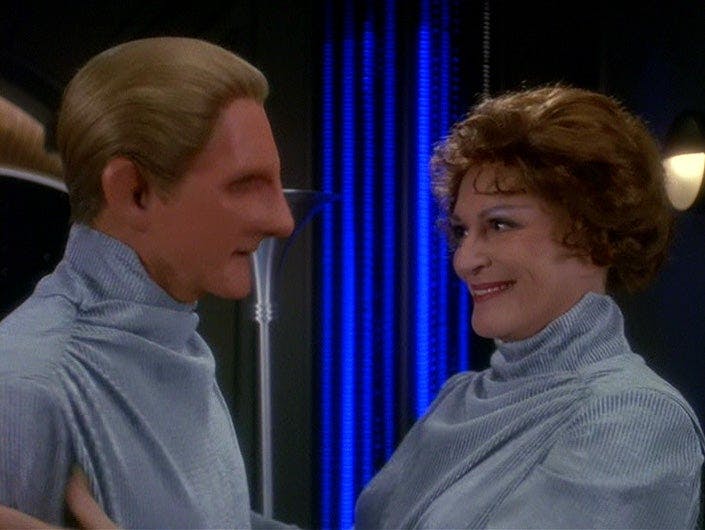
StarTrek.com
In order to rescue Lwaxana from her husband, Odo proposes to marry her. It is at first painted as a strictly strategic move. Her husband makes a point of declaring the wedding a charade and Odo’s love false, because it doesn’t fit the definition of romantic attraction. But when Odo finally vocalizes the emotions he does have for her, not even Lwaxana’s husband can doubt that Constable Odo loves Lwaxana Troi.
For the first time in my life, someone saw me as I was, and that changed me forever. The day I met her was the day I stopped being alone, and I want her to be part of my life from this day on.
- Odo “The Muse”
Odo lacked romantic and sexual attraction to Lwaxana, but his love for her as a friend carried just as much weight, perhaps even more.
I can’t help it: I’m still in love with you. And as I much as I wish you were in love with me, I know you’re not. I could stay, I could try to make you fall in love with me, but we both know that won’t happen. That I’d end up resenting you. And our friendship is far too important for me to let that happen.
- Lwaxana “The Muse”
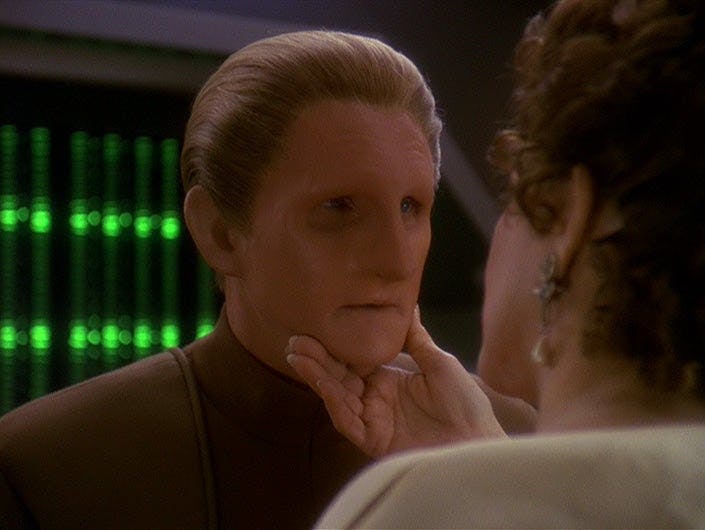
StarTrek.com
It is not often in fiction or in real life that the love of aromantic and asexual people is treated with importance or power. We are frequently told to conform to romantic and sexual standards in order to be accepted, to have our emotional needs met, to be able to give something back to others. While Deep Space Nine might still have given Odo a romantic subplot with Kira, the way his relationship plays out with Lwaxana Troi allows me to see a world that could love me enough to yield and make a place for me.
Abigail Dillon (she/her) is a college librarian and a staff writer for Eleven-ThirtyEight.com, an online Star Wars journal. She asks StarTrek.com not to hold that against her.

